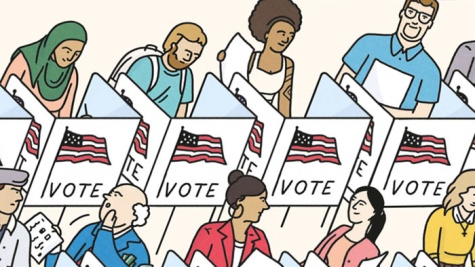
Tyler Pearce | Head Editor
January 17, 2024
As the 2024 elections approach, Generation Z is set to play a huge role. Born between 1997 and 2012, Gen Z is ready to bring new energy and ideas to the voting booths. So why is this generation so important, and what we can expect from them, based on their past actions and current trends?
In 2020, many “Gen-Zers” were too young to vote, but they still made an impact. For instance, they used TikTok to spread information about climate change and social justice. They also played a big part in organizing events like the “Global Climate Strike,” where millions of young people across the world demanded action on climate change. These activities show Gen Z’s commitment to important causes and their ability to mobilize others.
Now as voters, Gen Z is a force to reckon with. They make up about 10% of the electorate in 2024. This is significant because their votes could swing close races, especially in swing-states.
What sets Gen Z apart is their unique priorities. They tend to care deeply about issues like climate change, healthcare, and equality. For example, a survey by the Harvard Youth Poll found that over 70% of young Americans believe that the government should do more to curb climate change. This indicates that candidates who address these issues might gain Gen Z’s support.
In America, where voter turnout is roughly 66%, we need to make sure Gen Z utilizes their democratic rights, AP Government and IB Global Politics teacher Allison Shick states “We need participation for young voters, people want change, and in order for change to occur we need engaged and informed young voters – if we want democracy to work correctly.”
Gen Z’s influence goes beyond the ballot box. They are known for their activism and willingness to push for societal changes. Take the “March for Our Lives” movement as an example. Started by teenagers, this movement rallied hundreds of thousands of people across the U.S. to protest for gun control reforms. This kind of activism shows that Gen Z is ready to work for the changes they want to see, not just during election season but all year round.
Gen Z’s familiarity with digital platforms also sets them apart. They use social media not just to communicate but to educate and mobilize. For instance, during the Black Lives Matter protests in 2020, Gen Zers used platforms like Instagram and Twitter to organize protests, share resources, and educate others about racial injustice. Senior Sara Sims stated, “even though I could’t vote, I posted on Instagram the transcript of Trump’s response when he was asked to address the problem of low trust in police among African Americans.” This shows their skill in using digital tools for political engagement.
To engage Gen Z, politicians need to be where they are, which means being active and authentic on social media. Candidates should also focus on the issues that matter to Gen Z, like climate policy and social justice. For example, a candidate who proposes clear, actionable plans to reduce carbon emissions or address racial inequalities is more likely to resonate with this generation.

In the context of social justice, Generation Z stands out as a particularly passionate and active group. This generation, having grown up in an era marked by rapid social and technological changes, senior Maddie Granite said, “I have roughly 8 hours a day of screen time on my phone.” Proving that our generation is very digitally savvy shows awareness of social justice issues and commitment to fixing them. This generation’s commitment to social justice not only reflects their values but also signals a shift in societal norms towards greater inclusivity and equity. Their active engagement in these issues is a defining characteristic of their collective identity and is likely to influence societal changes in the years to come.
Gen Z’s entry into the electorate in 2024 is not just about adding new voters. It’s about bringing in a generation with distinct priorities, a deep commitment to activism, and a mastery of digital communication. Their actions in the 2020 elections, from social media campaigns to organizing large-scale protests, show the possibilities of their potential impact. As this generation steps into their voting power, they are positioned to not only influence the outcomes of elections but to also reshape the political conversation in America. The 2024 elections will be more than just a political event; they will be a showcase of how Gen Z is ready to make their mark on the world.

Leave a Reply